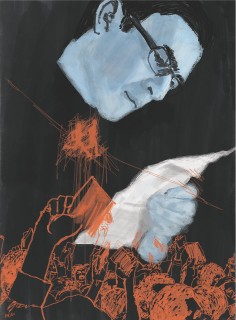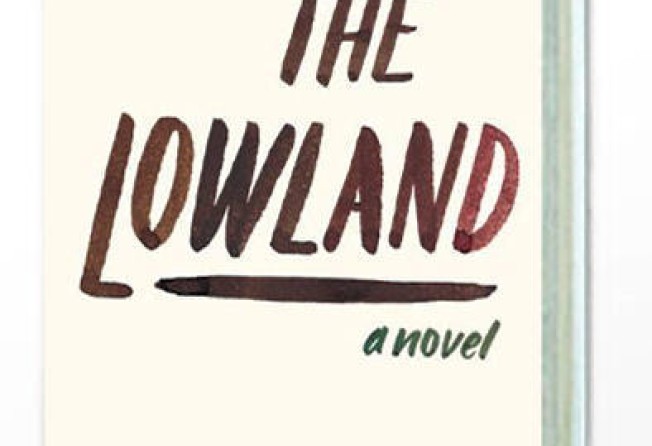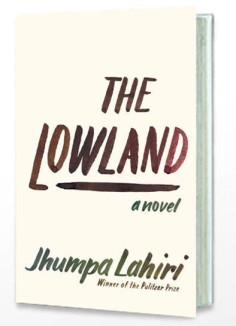
by Jhumpa Lahiri
Bloomsbury
4.5 stars
The turbulent modern history of West Bengal comes alive through tale of two estranged brothers

When Jhumpa Lahiri's second novel, The Lowland, was long-listed for the 2013 Booker Prize before it had even been released, nobody was exactly surprised.
Lahiri, a 46-year-old Bengali-American writer, is one of those rare talents who seems to do no wrong on the page. In 1999, she became one of the youngest authors ever to win the Pulitzer Prize for her debut short story collection, Interpreter of Maladies, and her two subsequent books, debut novel The Namesake and Unaccustomed Earth, another short story collection, have confirmed her status as the world's pre-eminent chronicler of the Bengali immigrant experience.
In some senses, The Lowland is a continuation of this, the abiding theme of all her writing. But in other ways, it is an altogether more ambitious undertaking, weaving the history of India's Naxalite movement and the brutal excesses of its paramilitary into the fabric of a more intimate story, a haunting tale of love, loyalty and estrangement, guilt and dislocation that spans generations and continents.
It begins in a leisurely, measured fashion, in the swampy Calcutta terrain "east of the Tolly Club", the exclusive country club where, in the early 19th century, Lahiri reminds us, "the British East India Company imprisoned the widows and sons of Tipu Sultan, the ruler of Mysore, after Tipu was killed in the fourth Anglo-Mysore war".
It's this swampy lowland that brothers Subhash and Udayan use as a shortcut to a field on the outskirts of their neighbouring Tollygunge enclave, where they play soccer. By the novel's end, the lowland no longer exists, yet it remains etched in the consciousness as a potent mythical heartland. A powerful motif of lost, broken lives and an all but forgotten history - yet a history whose legacy continues to play out upon untold lives in modern India.
Such is Lahiri's skill that the haunting significance of the lowland that lends her novel its title doesn't hit home until she draws all the strands of this ambitious, leisurely narrative together.
In the meantime, she takes us on a journey deep into the brothers' childhood, into Calcutta itself, on through some of the most turbulent and violent moments of its history, and onto the American continent, where the secrets of those years continue to play out upon the lives of her finely drawn characters.
Born just after the second world war, Subhash is older than Udayan by 15 months. He is more cautious than his brother, placid by nature. "But he had no sense of himself without Udayan," writes Lahiri. "His parents did not have to worry about him and yet they did not favour him. It became his mission to obey them, given that it wasn't possible to surprise or impress them. That was what Udayan did."
So inseparable are the boys they are even put into the same class at school where they learn the history of India and the world, of Calcutta and of their predominantly Muslim neighbourhood of Tollygunge, which was reclaimed from a mangrove swamp. But it is in science that the brothers are truly gifted, and the scientific details that pepper this novel take on an added and eerily beautiful significance. By the 1960s they are attending Calcutta's premier colleges: Udayan is studying physics and Subhash takes up chemical engineering.

In 2006, Indian prime minister Manmohan Singh described this Maoist insurgency as "the single biggest internal security challenge ever faced by our country", but until 1967 the brothers have never heard of this village in the Darjeeling tea-growing district about 640 kilometres from Calcutta. It makes headline news in India that year when dissident members of the Communist Party of India (Marxist) incite villagers in a revolt against oppression of the rural poor, and 11 people are killed.
Lahiri gives an assiduous accounting of the Naxalite movement, seaming the details of its complex birth and development deep into the fabric of her narrative. As the revolt develops into a full-blown insurgency and Calcutta becomes a hotbed of student unrest in the late 1960s, a rift grows between the brothers: Udayan disappears for a month and when he returns, wasted and ill, he is aloof and secretive.
By 1969, as Udayan joins a new communist party, whose members call themselves Naxalites, Subhash departs alone for Rhode Island in America to enter a PhD programme. "He no longer felt a part of it," writes Lahiri, "he felt the city was on the brink of something."
Subhash builds a successful but lonely life as a scientist in Rhode Island. He receives only two letters from Udayan, one of which includes a photograph of the daughter of a college friend he has secretly married, Gauri, who now lives in the family home with him. Three years after Subhash leaves India he receives a telegram, saying: "Come home, Udayan killed."
Subhash intuits, but never really discovers what his brother has done. But observing that Gauri, who is carrying his brother's child, is unwanted in his parents' house, he gifts her freedom by marrying her and taking her to America, thus tying himself forever to his brother.
In the academically gifted Gauri, Lahiri has created a difficult, unlikable character who for much of the novel seems ungrateful and emotionally distant. When Udayan's daughter, Bela, is born, it is Subhash who takes to parenthood like a duck to water. The pair fight over whether to tell Bela the truth about her parentage, but Subhash - who is terrified of losing Bela - resists. When Gauri abandons them for her burgeoning academic career, he raises Bela as his own, but remains in fear of that secret.
Plying its way between Calcutta and Rhode Island, between the violence of Calcutta in the 1960s and the tranquil beauty of Rhode Island in the present, the novel reads at times like an extended riff on loneliness, grief and cultural dissonance. There is no showiness in Lahiri's unadorned prose, no lyrical riffs, just an ability to distil the painful, emotional weight of human existence from the mundane, the ordinary, the fleeting, like no other.
But as the lonely years pass, Gauri's selfishness and her emotional detachment begin to make sense. For besides witnessing Udayan's death, she has carried another traumatic secret for years. It is only in The Lowland's closing stages that the shocking impact of this rather lethargic novel registers - an impact so profound, so utterly contemporary, that it resonates long after turning its final pages. Read it and you may well weep, but you'll also marvel at its power.